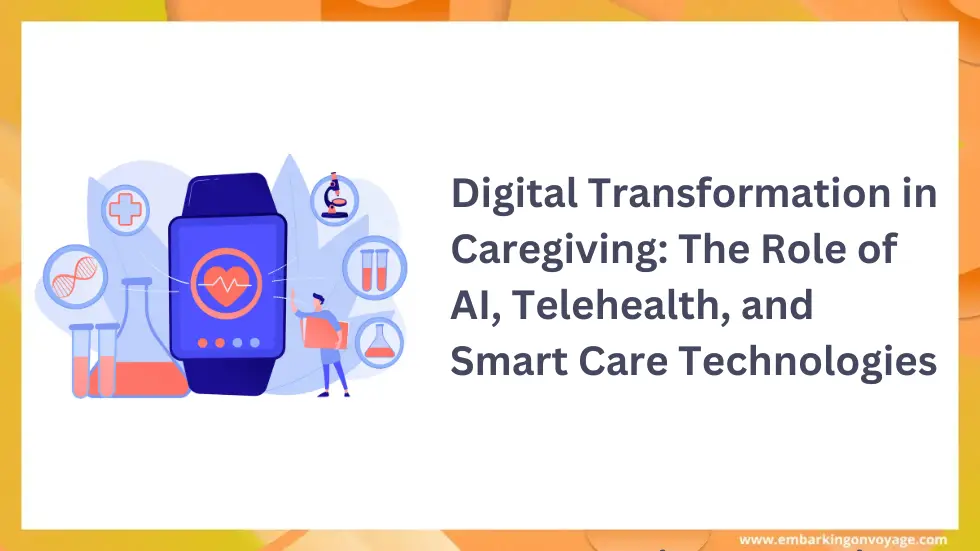The caregiving industry has always been centered on empathy, compassion, and human connection. However, compared to other sectors, it has been slower in adopting digital innovations.
That’s now changing rapidly. Digital transformation in caregiving is creating new opportunities to improve efficiency, safety, personalization, and collaboration in ways that were once unimaginable.
This shift is not about replacing human caregivers but empowering them with technology.
By leveraging caregiving technology, AI in caregiving, telehealth solutions, digital care management, and smart home caregiving technologies, the industry is building a stronger, more sustainable care ecosystem.
1. Empowering Caregivers with Efficiency and Reduced Burden
Caregiving can be both physically and emotionally demanding. Healthcare digitization is now offering solutions to reduce administrative workload, enabling caregivers to focus more on patient-centered care.
- Mobile Care Management Applications: Caregivers can now access patient records, care plans, and medication schedules instantly, reducing errors and improving communication across care teams and families.
- Remote Patient Monitoring (RPM): Wearable devices track vital signs, activity levels, and sleep patterns in real time. Data alerts ensure timely interventions, improving patient independence and reducing unnecessary in-person visits.
- AI-Powered Scheduling Tools: Intelligent rostering aligns caregivers with patient needs, availability, and skill sets, streamlining resource management while improving job satisfaction.
2. Enhancing the Quality and Personalization of Care
One of the biggest advantages of digital transformation in caregiving is the ability to deliver highly personalized care based on individual needs and preferences.
- Electronic Health Records (EHRs): Centralized medical histories and integrated care plans enable more holistic and collaborative care approaches.
- Telehealth Platforms: Virtual consultations and remote therapy sessions expand access to healthcare, particularly for patients with mobility challenges or those living in rural areas.
- Assistive & Smart Home Technologies: Automated lighting, fall detection systems, and medication dispensers enhance safety and independence, reducing reliance on direct caregiver supervision.
3. Strengthening Communication and Collaboration
Effective caregiving requires seamless collaboration among families, caregivers, and healthcare professionals. Digital care management tools now enable real-time, transparent communication.
- Secure Messaging Systems: HIPAA-compliant messaging ensures fast and secure communication between care teams and family members.
- Shared Care Journals: Digital platforms allow all stakeholders to track progress, updates, and goals, improving collaboration.
- Video Conferencing Tools: Families can actively participate in care planning, even from a distance, ensuring emotional connection and involvement.
4. Improving Safety and Reducing Risks
Technology-driven solutions help reduce risks for vulnerable patients, ensuring their safety and well-being.
- Fall Detection & Alert Systems: AI-powered sensors notify caregivers immediately when an incident occurs.
- Medication Management Systems: Digital verification reduces human error by ensuring correct dosage and timing.
- GPS Tracking for Cognitive Impairments: Location-based monitoring offers peace of mind for caregivers and safety for patients prone to wandering.
5. Unlocking Data-Driven Insights for Continuous Improvement
The integration of caregiving technology generates valuable insights that fuel smarter decisions and long-term innovation.
- Analytics Dashboards: Organizations can track KPIs like hospital readmission rates and caregiver response times.
- Predictive Analytics: Aggregated data highlights future care needs, enabling proactive planning and resource allocation.
- Research & Innovation: Anonymized datasets contribute to the development of new healthcare models and digital caregiving solutions.
Addressing Challenges in Digital Transformation
While the benefits are undeniable, the shift toward healthcare digitization comes with its own challenges:
- Digital Literacy: Both caregivers and patients need training to adopt new technologies effectively.
- Data Privacy & Security: Protecting sensitive healthcare data is crucial for compliance and trust.
- Maintaining Human Connection: Technology must remain a complement, not a substitute, for empathy and compassion.
- Ethical AI Practices: Transparent and fair AI adoption is necessary to avoid bias and ensure inclusivity.
The Future of Caregiving: Human-Cantered and Digitally Enhanced
The digital transformation in caregiving is reshaping the industry into a more efficient, personalized, and safe ecosystem.
By thoughtfully adopting AI in caregiving, telehealth solutions, remote patient monitoring, and smart home caregiving technologies, organizations can empower caregivers and improve the quality of life for care recipients.
Ultimately, the future of caregiving lies in striking the right balance: where advanced technology amplifies compassion, and human empathy remains at the heart of care.
Additional Resources:
